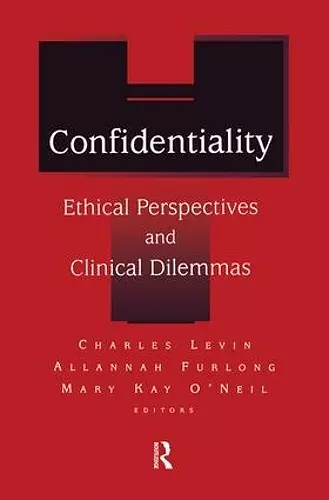Confidentiality
Ethical Perspectives and Clinical Dilemmas
Mary Kay O'Neil author Charles D Levin author Allanah Furlong author
Format:Paperback
Publisher:Taylor & Francis Ltd
Published:9th Jun '14
Currently unavailable, and unfortunately no date known when it will be back
This paperback is available in another edition too:
- Hardback£43.99(9780881633559)

The distinguished contributors to Confidentiality probe the ethical, legal, and clinical implications of a deceptively simple proposition: Psychoanalytic treatment requires a confidential relationship between analyst and analysand. But how, they ask, should we understand confidentiality in a psychoanalytically meaningful way? Is confidentiality a therapeutic requisite of psychoanalysis, an ethical precept independent of psychoanalytic principles, or simply a legal accommodation with the powers that be?
In wrestling with these questions, the contributors to Confidentiality are responding to a professional, ethical, and political crisis in the field of mental health. Psychotherapy - especially long-term psychotherapy in its psychoanalytic variants - has been undermined by an erosion of personal privacy that has become part of our cultural zeitgeist. The heightened demand for public transparency has forced caregivers from all walks of professional life to submit to increasing bureaucratic regulation.
For the contributors to this collection, the need for confidentiality is centrally involved in the relationship of the psychotherapeutic professions both to society and to the law. No less importantly, the requirement of confidentiality brings a clarifying perspective to debates within the psychotherapeutic literature about the relationship of theory to practice. It thereby provides a framework for shaping a set of ethical principles specifically adapted to the psychotherapeutic, and especially to the psychoanalytic, relationship.
Linking general issues of privacy to the intimate details of psychotherapeutic encounter, Confidentiality will serve as a basic guide to a wide range of professionals, including lawyers, social scientists, philosophers, and, of course, psychotherapists. Therapy patients, policy makers, and the wider public will also find it instructive to know more about the special protected conditions under which one can better come to "know thyself."
"...this book deserves to reach all therapists, not just those committed to a single school of thought....this volume is recommended as urgent reading for all psychotherapists who are troubled by the erosion of supposedly confidential communications in their professional work."
- Psychotherapy: Theory, Research, Practice, Training
"This excellent collection of thoughtful essays examines in depth the role of confidentiality in psychoanalysis. It addresses a set of issues that range from the clinical relationship and the privacy of the self to the intersection of psychoanalytic practice with its social and cultural surround. More than an ethical or legal treatise, this book shows confidentiality to be, in the editors' words, 'a complex form of professional practice that links privacy and freedom of thought with the heart and essential methodology of the psychoanalytic encounter.'"
- Howard B. Levine, M.D., Chair, Joint Committee on Confidentiality, American Psychoanalytic Association
"Only rarely does a conference metamorphose into an outstanding book. Confidentiality has made that journey. It shows how analysts experience, and mediate among, conflicting obligations to patients, supervisors, and students, to research and to writing. This book is not only about confidentiality but also about conundrums that inhere in the psychoanalytic endeavor. I feared it would be a dry read, but it turned out to be juicy, pleasurable, and informative."
- Ethel Spector Person, M.D., Training and Supervising Analyst, Columbia University Center for Psychoanalytic Training and Research
"The subject of confidentiality is a topic that is always current and relevant. The strength of the book lies in the presentation of the broad perspective and the associated ethical perspectives that are often overlooked but are nonetheless relevant. In addition, the reader is reminded of the clinical confidentiality dilemmas that often accompany psychotherapy irrespective of the theoretical framework utilized by the therapist."
- Martha Barham, R.N., Ph.D., in American Journal of Clinical Hypnosis
"...this book deserves to reach all therapists, not just those committed to a single school of thought....this volume is recommended as urgent reading for all psychotherapists who are troubled by the erosion of supposedly confidential communications in their professional work."
—Psychotherapy: Theory, Research, Practice, Training
"This excellent collection of thoughtful essays examines in depth the role of confidentiality in psychoanalysis. It addresses a set of issues that range from the clinical relationship and the privacy of the self to the intersection of psychoanalytic practice with its social and cultural surround. More than an ethical or legal treatise, this book shows confidentiality to be, in the editors' words, 'a complex form of professional practice that links privacy and freedom of thought with the heart and essential methodology of the psychoanalytic encounter.'"
—Howard B. Levine, M.D
Chair, Joint Committee on Confidentiality, American Psychoanalytic Association
"Only rarely does a conference metamorphose into an outstanding book. Confidentiality has made that journey. It shows how analysts experience, and mediate among, conflicting obligations to patients, supervisors, and students, to research and to writing. This book is not only about confidentiality but also about conundrums that inhere in the psychoanalytic endeavor. I feared it would be a dry read, but it turned out to be juicy, pleasurable, and informative."
—Ethel Spector Person, M.D
Training and Supervising Analyst, Columbia University Center for Psychoanalytic Training and Research
ISBN: 9781138005679
Dimensions: unknown
Weight: 476g
350 pages